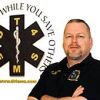It’s 9:15 a.m. and you are at your station finishing truck check and chores when a man drives up. He gets out of his car and appears agitated; he begins demanding the names of staff members present. He’s asked to leave and struggle ensues.
Within moments you realize you have been stabbed in the head and are bleeding profusely.
How would you respond? Do you strike him? Do you push away? Do you yell? If so, what do you say?
Taking a moment to put yourself in the shoes of the providers attacked is mental role-playing, and it is a scene-safety tactic that must not be overlooked. Mental preparation for escaping a violent encounter is as important as any physical skill you may possess.
Police officers are trained to use mental role-playing daily. They play the “what-if” games in their head to speed up reaction time and not freeze if attacked by surprise.
For example, an officer on patrol may imagine stopping someone who jumps from the driver’s seat and charges toward the patrol car pointing a gun. The officer mentally rehearses, step by step, every possible scenario that could follow.
If he is shot, how does he get out of his seatbelt? Does he put the patrol car in reverse? Does he pull forward?
Save yourself the same way you save patients
This concept is not unique; you were taught it in the form of pre-arrival preparation. When en route to a scene, you begin to play the “what-if” games in your head in preparation for the medical treatments you plan to perform.
You formulate a plan based on dispatch information and the nature of the call. You have to think about the equipment to bring, location and other resources.
So, if you are already using this mental preparation to save someone else, why then is it such a foreign idea to have a mental plan to save yourself?
Why we fight, flight or freeze
Those in the medical field are familiar with sympathetic nervous system, also known as fight or flight. Yet there is another F in the mix that doesn’t get as much attention — freeze.
This primal response to insult or injury can happen to a person due to a real or perceived threat. In other words, a person might claim they are going to punch you, or actually punch you without saying a word.
The body’s initial reaction may include an increase in heart rate, a dilation of the pupils, an increased rate and depth of respiration, a decrease in peristalsis and an increase in sweat production.
The sympathetic response adrenaline dump prepares you to fight or flight.
But a freeze response may also occur.
By knowing these physiological changes will occur the provider can recognize them as normal and having mentally role-played, the amount of time the freeze occurs can be greatly reduced.
There are other physiological changes. A person will experience a loss of fine motor skills (try to write your name after you have been scared). Some people may experience tunnel vision. It is the natural response to visually lock-on to the perceived threat, and this will affect your ability to see things around you.
You may have auditory exclusion (not hear certain things) because you are so focused on the threat. It may distort you recollection of the events.
We have all heard of the deer in the headlights — frozen by fear. This pattern resembles the freezing seen in many animal species when confronted with threatening stimuli, which is controlled by nerve responses designed to promote defensive survival.
R.A.C.E.
In training literally hundreds of people in self-defense, I have made some on my own non-scientific observations.
When a physical skill is new, the defender usually has very jerky, almost robotic movements. Yet once their brains begin to understand the skill, the more smooth their movements become.
As an observer, you can watch them attempting to process the information, and we call this RACE: Recognize, Analyze, Calculate and Execute. Having an understanding of RACE motivates a provider to train in both mental and physical skills.
Why role-play?
Many in EMS have never thought of being the victim of an assault; some have never been in a physical fight since grade school. This is where defensive tactics suit can be useful. Having a role-player in a padded suit allows for more realistic training.
After the provider is attacked as part of the training, the provider usually talks about the scenario — often over and over. This mental replay is a form of mental training. The provider goes over the situation, processing what he did right and what he could have done better.
The ultimate goal in mental role-playing as taught in Escaping Violent Encounters is to train the body to move. Movement will create opportunity to escape with less damage.
Take the time to look at the types of attacks that are most common, and do your own mental role-play of “what would I do” scenarios if one of those attacks happened on your scene.
Simply taking a few minutes every day to imagine scene safety can make all the difference in the world if you have to face a violent encounter.


